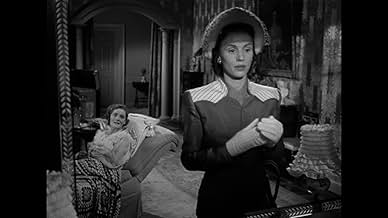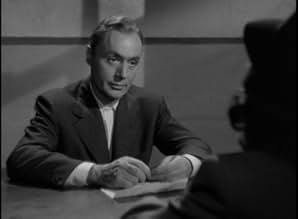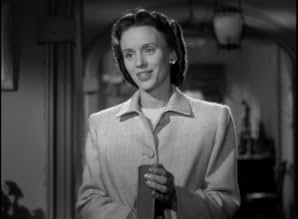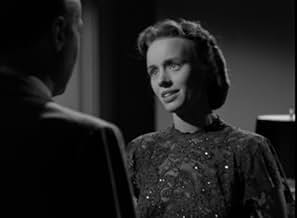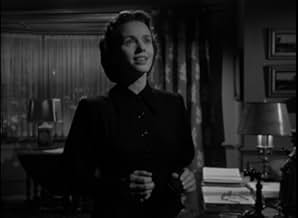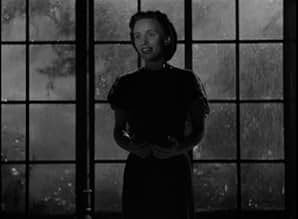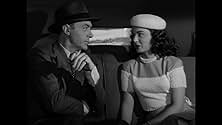CALIFICACIÓN DE IMDb
6.8/10
986
TU CALIFICACIÓN
Agrega una trama en tu idiomaA cheating husband is charged in the poisoning death of his invalid wife, in spite of other women and suicide also being suspected.A cheating husband is charged in the poisoning death of his invalid wife, in spite of other women and suicide also being suspected.A cheating husband is charged in the poisoning death of his invalid wife, in spite of other women and suicide also being suspected.
- Premios
- 3 premios ganados en total
Patrick Aherne
- Warder
- (sin créditos)
Mari Aldon
- Girl
- (sin créditos)
Wilson Benge
- Clerk
- (sin créditos)
Lydia Bilbrook
- Mrs. Fellows
- (sin créditos)
Opiniones destacadas
Aldous Huxley possessed one of the greatest intellects and was one of the most original thinkers of the Twentieth, or indeed, any century. He also made a great deal of money writing screenplays in Hollywood.
His short story of 1922 'The Giaconda Smile' is his most anthologised and so as not to baffle the average cinema-goer the title here has been changed to 'A Woman's Vengeance' which merely serves to give the game away from the outset!
We should be grateful at least that the adaptation has not been assigned to some Hollywood hack but has been done by the author himself although the infernal compromises of film have obliged him to deviate from his original.
The suspected wife poisoner has been transformed from the flawed Anglo-Saxon Hutton to the Gallic Maurier of inveterate charmer Charles Boyer and his naive bit of fluff Doris, played by Ann Blythe, is needless to say no longer a Cockney! The character of Janet Spence, described by Huxley as resembling Agrippina 'or perhaps George Robey', is played by Jessica Tandy. All do what they do very well but it is the performance of the superlative Miss Tandy that lingers longest. She depicts frustrated passion and sexual repression as strongly as would have been permitted at the time and is absolutely riveting if a little too attractive.
For filmic purposes the character of Doctor Libbard has been fleshed out considerably by Mr. Huxley and is beautifully played by Cedric Hardwicke. His character not only serves as Maurier's conscience but saves him from the gallows, thereby drastically altering the original ending but that's Hollywood for you.
It is capably directed by Zoltan Korda although one senses that he is more suited to the great outdoors. Noirish touches by cinematographer Russell Metty and a suitably dramatic score by the great Miklos Rozsa.
It was Sir Cedric who said: "God felt sorry for actors so he created Hollywood to give them a place in the sun and a swimming pool. The price they had to pay was to surrender their talent." The same would apply to writers it seems!
His short story of 1922 'The Giaconda Smile' is his most anthologised and so as not to baffle the average cinema-goer the title here has been changed to 'A Woman's Vengeance' which merely serves to give the game away from the outset!
We should be grateful at least that the adaptation has not been assigned to some Hollywood hack but has been done by the author himself although the infernal compromises of film have obliged him to deviate from his original.
The suspected wife poisoner has been transformed from the flawed Anglo-Saxon Hutton to the Gallic Maurier of inveterate charmer Charles Boyer and his naive bit of fluff Doris, played by Ann Blythe, is needless to say no longer a Cockney! The character of Janet Spence, described by Huxley as resembling Agrippina 'or perhaps George Robey', is played by Jessica Tandy. All do what they do very well but it is the performance of the superlative Miss Tandy that lingers longest. She depicts frustrated passion and sexual repression as strongly as would have been permitted at the time and is absolutely riveting if a little too attractive.
For filmic purposes the character of Doctor Libbard has been fleshed out considerably by Mr. Huxley and is beautifully played by Cedric Hardwicke. His character not only serves as Maurier's conscience but saves him from the gallows, thereby drastically altering the original ending but that's Hollywood for you.
It is capably directed by Zoltan Korda although one senses that he is more suited to the great outdoors. Noirish touches by cinematographer Russell Metty and a suitably dramatic score by the great Miklos Rozsa.
It was Sir Cedric who said: "God felt sorry for actors so he created Hollywood to give them a place in the sun and a swimming pool. The price they had to pay was to surrender their talent." The same would apply to writers it seems!
Rachel Kempson is the bedridden, whining wife of rich Charles Boyer. She complains about everything and everyone, and only Mildred Natwick, as her man-hating nurse, seems to sympathize with her. Boyer does what he can in a weary, dutiful manner, but takes pleasure in flirting with next-door neighbor Jessica Tandy on the subject of modern art. He's also got Ann Blyth as an 18-year-old mistress. Then Kempson dies, Boyer marries his pregnant mistress almost immediately, and Miss Natwick insists on an autopsy. It turns out the dead woman was poisoned, and Boyer is on trial for murder.
I thought the first half of this movie was fabulous, with a cast that played it to the hilt, particularly Mildred Natwick, so vilely self-righteous. The problem for me lay in the second half, because I picked out the murderer as soon as the death scene was described, and Hardwicke's pick-pick-picking at the scabs of the other character's souls, beautifully written by Aldous Huxley, and performed though it was, seemed to me long-winded.
That's the problem when you figure out a mystery well before the end, motive, method and opportunity; you spend the time wondering how everyone in the movie (or book) can be so blind. So I spent my time reworking it as a stage play, wondering about the bare minimum of sets. I made it four.
I thought the first half of this movie was fabulous, with a cast that played it to the hilt, particularly Mildred Natwick, so vilely self-righteous. The problem for me lay in the second half, because I picked out the murderer as soon as the death scene was described, and Hardwicke's pick-pick-picking at the scabs of the other character's souls, beautifully written by Aldous Huxley, and performed though it was, seemed to me long-winded.
That's the problem when you figure out a mystery well before the end, motive, method and opportunity; you spend the time wondering how everyone in the movie (or book) can be so blind. So I spent my time reworking it as a stage play, wondering about the bare minimum of sets. I made it four.
This movie provides some interesting character studies by Aldous Huxley. Charles Boyer portrays Henry, a not very likeable husband to an invalid wife,Emily (Rachel Kempson). He has a very young mistress on the side, Doris, played by Ann Blythe. On the sidelines stands Janet, played by Jessica Tandy, whom Henry flirts with as a matter of course, but she takes it all very seriously and is in love with him. When Emily is murdered, Henry is arrested and sentenced to death by hanging. The second half of the movie deals with the secrets underlying Emily's death. Very well done with one flaw. Ann Blythe seems to start out in the movie as a selfish, manipulative young mistress and her transformation to a caring wife seems a bit of a stretch. Mildred Natwick is superb as a nosy nurse as is Cedric Hardwicke as a doctor who just about effortlessly steals every scene he is in. A true pro. 8 out of 10.
The obvious movie title here rather negates the initial whodunit mystery of who really killed, if indeed she was killed, the troubled invalid wife, Rachel Kempson, of philandering country gentleman, Charles Boyer. It could have been suicide, maybe it was the wife's devoted but jealous, approaching middle-age friend Jessica Tandy or even the waspish nurse Mildred Gatwick but soon enough the fickle finger of blame points squarely at Boyer, who we learn, has motives for murder coming out of his ears. Firstly, he plainly doesn't love his wife, secondly, he's cutting about with his adoring teenage lover, soon-enough his wife, Ann Blyth and thirdly he's just taken out a large death policy on his wife's life.
And die she does, of poisoning, which naturally brings Boyer a world of trouble as he is charged with and goes on trial for his wife's murder. We learn that Tandy carries a bigger torch than Lady Liberty for Boyer and see him reject her advances which certainly lines her up as a woman of vengeance from where I'm sitting. The accused has only one real ally, although considering the help he offers Boyer, we should all have the family doctor, Cedric Hardwicke on our side.
Anyway, I'll leave the plot hanging there lest I give too much away. Unsurprisingly, given the film was adapted from a play of the celebrated novelist Aldous Huxley who also contributed to the screenplay, there are screeds of heavy dialogue with little in the way of backgound music to influence the viewer's perceptions one way or the other. Some of this dialogue is quite weighty and intense but it just as often flounders into unnatural bombast
Director Zoltan Korda steps politely over and around some of the stickier plot-points and unlikely and sometimes fast-changing characterisations. Boyer is good as the love-him-or-hate-him central character, Tandy is even better as the spurned sinister spinster while Hardwicke is solid as the doc who literally clocks what's going on.
Although it's all highly unlikely, I was nonetheless carried along by the sometimes improbable events depicted. Characters exchange a lot of often expository dialogue as the narrative grinds ever further forward and I liked the surprising and unconventional ending with the viewer left to the job of tying up the loose ends by themselves.
An unusual but far from uninteresting and uninvolving feature.
And die she does, of poisoning, which naturally brings Boyer a world of trouble as he is charged with and goes on trial for his wife's murder. We learn that Tandy carries a bigger torch than Lady Liberty for Boyer and see him reject her advances which certainly lines her up as a woman of vengeance from where I'm sitting. The accused has only one real ally, although considering the help he offers Boyer, we should all have the family doctor, Cedric Hardwicke on our side.
Anyway, I'll leave the plot hanging there lest I give too much away. Unsurprisingly, given the film was adapted from a play of the celebrated novelist Aldous Huxley who also contributed to the screenplay, there are screeds of heavy dialogue with little in the way of backgound music to influence the viewer's perceptions one way or the other. Some of this dialogue is quite weighty and intense but it just as often flounders into unnatural bombast
Director Zoltan Korda steps politely over and around some of the stickier plot-points and unlikely and sometimes fast-changing characterisations. Boyer is good as the love-him-or-hate-him central character, Tandy is even better as the spurned sinister spinster while Hardwicke is solid as the doc who literally clocks what's going on.
Although it's all highly unlikely, I was nonetheless carried along by the sometimes improbable events depicted. Characters exchange a lot of often expository dialogue as the narrative grinds ever further forward and I liked the surprising and unconventional ending with the viewer left to the job of tying up the loose ends by themselves.
An unusual but far from uninteresting and uninvolving feature.
This film noir gem spins the tale of romance, unrequited love and revenge that conspire to frustrate a spinster in her pursuit of a man. The romance involves the man's dalliances with an attractive girl and the unrequited love is the bitter fruit of the spinster's quest to capture the man for herself. The revenge plays out its part in due course as the triangle emerges with malevolent undercurrents taking shape. The cast is excellent, especially Jessica Tandy and Sir Cedric Hardwicke, with Charles Boyer caught in the middle by the eager, determined females. Ann Blyth marries her suave suitor and sets in motion the cold fury of the spurned woman who can only watch as her dreams of happiness are dashed. The black and white camera work has a brooding quality and gives the film a classic film noir look.
¿Sabías que…?
- TriviaHenry Maurier quotes from Wordsworth's 'Ode to Duty' (published 1807): "Stern daughter of the Voice of God"
- ErroresAlthough Emily's gravestone and numerous newspaper articles establish the time of the story as 1931 all the women's hair styles, clothing, and overall demeanor are strictly 1947.
- Citas
General Spence: Wouldn't have minded being a dog myself. Comfortable kennels, free meals, unlimited access to the females of the species, and when you're old, they shoot you. No wheelchairs, no torture, no blasted nurses - one bang and it's over.
- ConexionesReferenced in Inside the Actors Studio: Martin Scorsese (2002)
Selecciones populares
Inicia sesión para calificar y agrega a la lista de videos para obtener recomendaciones personalizadas
- How long is A Woman's Vengeance?Con tecnología de Alexa
Detalles
- Fecha de lanzamiento
- País de origen
- Sitios oficiales
- Idiomas
- También se conoce como
- A Woman's Vengeance
- Locaciones de filmación
- Productora
- Ver más créditos de la compañía en IMDbPro
- Tiempo de ejecución1 hora 36 minutos
- Color
- Relación de aspecto
- 1.37 : 1
Contribuir a esta página
Sugiere una edición o agrega el contenido que falta

Principales brechas de datos
By what name was Venganza de mujer (1948) officially released in India in English?
Responda
